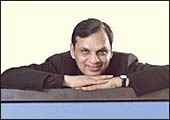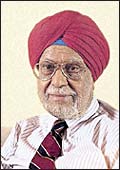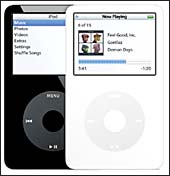 |
| Videocon's Dhoot: The acquisition game
continues |
By
now, it must be evident to most people that Venugopal Dhoot, Chairman
of the Videocon Group, enjoys acquisitions a great deal. And if
the company in play is not in the best of health, so much the
better for he can then drive a hard bargain. Over the past few
weeks, Dhoot has been in the news for looking to buy over Korean
consumer durables major, Daewoo Electronics, Massachusetts headquartered
digital imaging pioneer, Polaroid Corporation, and the plasma
display panel manufacturing facilities of Taiwan-based Chungwa
Picture Tubes (biggies like LG, Samsung, Haier are in the fray
in the case of the first two).
The acquisition game isn't new to Videocon
and Dhoot. Last year, the man bought over French electronic firm
Thomson's colour picture tube division, and Electrolux's operations
in India; the Swedish company's Indian ops had been in the red
for a while now, it was looking for a buyer, and the deal included
its manufacturing facilities in India and the right to use the
brand name in some markets in this part of the world.
The Daewoo deal, if it happens, could give Videocon
a foothold in key markets like Korea, Japan and the US. And the
Polaroid one, a toehold in the US and the company's LCD manufacturing
facility. The fact that Polaroid is in a financial mess only makes
it more attractive for Dhoot who is known to buy cheap and make
the most of it subsequently. Can he do it this time as well? "We
have signed non-disclosure agreements with Daewoo and Polaroid.
I cannot say anything more at this stage," is all the man
will say.
-Krishna Gopalan
NUMBERS
OF NOTE
$3.5 billion
(Rs 15,750 crore): The value of
convertible bonds issued by India in 2005, making it the biggest
issuer in Asia
25%: Proportion
of primary school teachers in India who don't show up to work,
according to a recent World Bank Survey
Rs 2,000 crore:
The estimated cost of the upcoming assembly elections in five
states
30 million:
The estimated number of bags temporarily lost by airlines
in 2005; 200,000 of these were never reunited with their owners
84%: Occupancy
rate in Hyderabad's five star hotels during the nine months ended
December 2005, the highest in the country. The occupancy in Bangalore
during the same period averaged 76.5 per cent, north Mumbai, 76.3
per cent and Delhi, 75.8 per cent
400: The
number of obesity-related bills which were introduced in state
legislatures across the US in 2005, more than double the number
in 2003. A quarter of them were passed into laws
$200 million
(Rs 900 crore): Estimated earnings of Nollywood, Nigeria's
film industry, in 2005 making it the world's third biggest film
industry after that of America and India
Rs 6,600 crore:
The estimated value of the domestic IT enabled services market
in 2006-07, up from about Rs 3,800 crore in 2005-06, according
to a NASSCOM-IDC study
 $6
million (Rs 27 crore): The salary and bonus that Neville Isdell
earned for 2005, his first full year as CEO and Chairman at beverage
giant Coca-Cola Co. Isdell was paid a salary of $1.5 million (Rs
6.75 crore) and a $4.5 million (Rs 20.25 crore) bonus, the company
said. In 2004, he received a salary of $8,75,000 (Rs 3,93,75,000)
and a bonus of nearly $2.9 million (Rs 13.05 crore). Isdell also
received options on 620,690 shares in 2005, compared with 450,000
the prior year (2004) $6
million (Rs 27 crore): The salary and bonus that Neville Isdell
earned for 2005, his first full year as CEO and Chairman at beverage
giant Coca-Cola Co. Isdell was paid a salary of $1.5 million (Rs
6.75 crore) and a $4.5 million (Rs 20.25 crore) bonus, the company
said. In 2004, he received a salary of $8,75,000 (Rs 3,93,75,000)
and a bonus of nearly $2.9 million (Rs 13.05 crore). Isdell also
received options on 620,690 shares in 2005, compared with 450,000
the prior year (2004)
45
billion pairs: The number of disposable chopsticks used by
the Chinese every year, which adds up to 1.7 million cubic metres
of timber or 25 million full-grown trees
SOUTH
ASIA'S GROWTH PICTURE
The latest world
Bank report says that on the basis of present growth trends, South
Asia will meet the Millennium Development Goal (MDG) of halving
poverty (see chart). If the region's growth rate accelerates to
10 per cent, the subcontinent will be substantially free of poverty
by 2015. For the record, South Asia's gross domestic product (GDP)
has grown at 5.5 per cent a year, with the growth in the two largest
countries in the region-India and Pakistan-accelerating to 7 per
cent in the last two years.
NOTED
 ACQUIRED:
By Bangalore-based Biotech major Biocon (CEO Kiran Mazumdar-Shaw,
left), US firm Nobex for $5 million (Rs 22.5 crore). This is Biocon's
first overseas acquisition and involves only the assets of Nobex,
which filed for bankruptcy in December 2005, including some 300
patents. Nobex was Biocon's partner in an initiative to develop
and sell, among other things, oral insulin. Biocon had, over a
period of time, invested $6 million (Rs 27 crore) in the company. ACQUIRED:
By Bangalore-based Biotech major Biocon (CEO Kiran Mazumdar-Shaw,
left), US firm Nobex for $5 million (Rs 22.5 crore). This is Biocon's
first overseas acquisition and involves only the assets of Nobex,
which filed for bankruptcy in December 2005, including some 300
patents. Nobex was Biocon's partner in an initiative to develop
and sell, among other things, oral insulin. Biocon had, over a
period of time, invested $6 million (Rs 27 crore) in the company.
VISITING: Craig
Tiedmanin, a top Pentagon official, Anand, Gujarat, to understand
the Amul model of rural development from India's 'Milkman' Verghese
Kurien who, ironically, resigned his post as Chairman of the Gujarat
Cooperative Milk Marketing Federation in anticipation of a no-confidence
motion.
PARTICIPATING:
IT major Infosys, in a pilot programme on the use of interactive
statements in financial filings being conducted by the US securities
and Exchange Commission. Some 17 companies have thus far agreed
to participate in this, with Infosys being the only Indian firm
to do so.
FROZEN: The bank
account of Dharmesh Doshi, in Credit Suisse Bank (balance: around
£6 million or Rs 46.8 crore), at the behest of India's Central
Bureau of Investigation. Doshi is believed to be an aide of Ketan
Parekh, the man behind the 2001 stock market meltdown.
 DECEASED:
Bhai Mohan Singh, 89, the founder of Ranbaxy Laboratories on March
27, in New Delhi, after a long illness. The enterprising Singh
was a pioneer in the Indian pharmaceutical space. From Max New
York Life (part of the Max India group, founded by Singh and his
youngest son Analjit) to Fortis (promoted by Ranbaxy), this was
the man who was responsible for it all in some way. DECEASED:
Bhai Mohan Singh, 89, the founder of Ranbaxy Laboratories on March
27, in New Delhi, after a long illness. The enterprising Singh
was a pioneer in the Indian pharmaceutical space. From Max New
York Life (part of the Max India group, founded by Singh and his
youngest son Analjit) to Fortis (promoted by Ranbaxy), this was
the man who was responsible for it all in some way.
APPLE
IS 30
April 1, 1976:
Steve Jobs, Steve Wozniak, and Ronald Wayne found Apple.
1980: Apple makes an IPO.
1983: John Sculley leaves Pepsi for
Apple.
1984: Mac launched with now-cult '1984'
commercial, directed by Ridley Scott and aired during Super Bowl.
1985: Woz resigns; so does Jobs.
1986: Jobs buys Lucasfilm's graphics
group and founds Pixar.
1993: Sculley resigns; Powerbook sales
exceed 1 million.
1995: 1 millionth PowerMac rolls out.
1996: Gil Amelio named CEO.
1997: Amelio resigns; Jobs is back
as interim CEO.
1998: Iconic iMac is launched.
2000: Jobs becomes permanent CEO;
launches PowerMac Cube.
2001: First iPod rolls out.
2002: Launches iMac G4.
2003: iTunes store is launched.
2004: Launches iMac G5.
2005: Launches iPod Nano, Video iPod;
iTunes downloads exceed 500 million; allies with Intel.
2006: Walt Disney buys Pixar; Jobs
named on Disney board; rumours of new iPod, tablet, Powerbook
to commemorate 30 years refuse to go away.
|





 $6
$6 ACQUIRED:
ACQUIRED:
 DECEASED:
DECEASED: